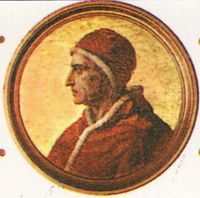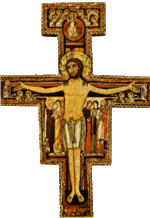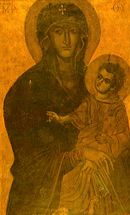گريگوري الثاني عشر
| گريگوري الثاني عشر | |
|---|---|
 | |
| Papacy began | 30 نوفمبر 1406 |
| انتهت بابويته | 4 يوليو 1415 |
| سبقه | Innocent VII |
| خلفه | مارتن الخامس |
| الترسيم | 12 يونيو 1405 |
| تفاصيل شخصية | |
| اسم الميلاد | Angelo Correr or Corraro |
| وُلِد | c. 1326 or between 1335 and 1345 البندقية، جمهورية البندقية |
| توفي | 18 أكتوبر 1417 Recanati, Marche, Papal States |
| پاپوات آخرون اسمهم گريگوري | |
| أساليب {{{papal name}}} | |

| |
| أسلوب الإشارة إليه | His Holiness |
| نمط الحديث | Your Holiness |
| النمط الديني | Holy Father |
| أسلوب بعد الوفاة | None |
گريگوري الثاني عشر Pope Gregory XII, (و. 1326 - ت. 18 أكتوبر 1417)، Angelo Correr or Corraro, كان البابا من 1406 حتى 1415.He succeeded Pope Innocent VII on 30 November 1406.
Gregory was chosen at Rome in 1406 by a conclave consisting of only fifteen cardinals under the express condition that, should Antipope Benedict XIII (1394-1423), the rival papal claimant at Avignon, renounce all claim to the Papacy, he would also renounce his, so that a fresh election might be made and the Western Schism (1378-1417) could be ended.
The two pontiffs opened wary negotiations to meet on neutral turf at Savona in Liguria, but soon began to waver in their resolve. The Correr relatives of Gregory XII in Venice and King Ladislaus of Naples, the supporter of Gregory XII and his predecessor for political reasons, used all their influence to prevent the meeting, and each Pope feared being captured by the party of the rival Pope.
The cardinals of Gregory XII openly showed their dissatisfaction at this maneuvering and gave signs of their intention to abandon him. On 4 May 1408, Gregory XII convened his cardinals at Lucca and ordered them not to leave the city under any pretext. He tried to supplement his following by creating four of his Correr nephews cardinals - including the future Pope Eugene IV, despite his promise in the conclave that he would create no new cardinals. Seven of the cardinals secretly left Lucca and negotiated with the cardinals of Benedict XIII concerning the convocation of a general council by them, at which both pontiffs should be deposed and a new one elected. Consequently they summoned the council to Pisa and invited both pontiffs to be present. Neither Gregory XII nor Benedict XIII appeared. Meanwhile Gregory XII stayed with his loyal and powerful protector, the condottiero Carlo I Malatesta, who had come to Pisa in person during the process of the council to support Gregory XII with both sets of cardinals. At the fifteenth session, 5 June 1409, the Council of Pisa deposed the two pontiffs as schismatical, heretical, perjured, and scandalous; they elected Alexander V (1409-10) later that month. Gregory XII, who had meanwhile created ten more cardinals, had convoked a rival council at Cividale del Friuli, near Aquileia; but only a few bishops appeared. Gregory XII's cardinals pronounced Benedict XIII and Alexander V schismatics, perjurers, and devastators of the Church, but their pronouncement went unheeded.
The Council of Constance finally resolved the situation. Gregory XII appointed Carlo Malatesta and Cardinal Giovanni Dominici of Ragusa as his proxies. The cardinal then convoked the council and authorized its succeeding acts, thus preserving the formulas of Papal supremacy. Thereupon on 4 July 1415, Malatesta, acting in the name of Gregory XII, pronounced the resignation of the Pope, which the cardinals accepted. According to prior agreement, they agreed to retain all the cardinals that had been created by Gregory XII, thus satisfying the Correr clan, and appointed Gregory XII Bishop of Frascati, Dean of the Sacred College of Cardinals and perpetual legate at Ancona. The Council then set aside Antipope John XXIII (1410-15), the successor of Alexander V. After the former follower of Benedict XIII appeared, the council declared him deposed; and the Great Schism was ended. A new Roman pontiff, Pope Martin V, was not elected before Gregory's death.
The rest of Gregory XII's life was spent in peaceful obscurity in Ancona.
. . . . . . . . . . . . . . . . . . . . . . . . . . . . . . . . . . . . . . . . . . . . . . . . . . . . . . . . . . . . . . . . . . . . . . . . . . . . . . . . . . . . . . . . . . . . . . . . . . . . . . . . . . . . . . . . . . . . . . . . . . . . . . . . . . . . . . . . . . . . . . . . . . . . . . . . . . . . . . . . . . . . . . . .
المصادر
 هذه المقالة تضم نصاً من مطبوعة هي الآن مشاع: هربرمان, تشارلز, ed. (1913). . الموسوعة الكاثوليكية. Robert Appleton Company.
هذه المقالة تضم نصاً من مطبوعة هي الآن مشاع: هربرمان, تشارلز, ed. (1913). . الموسوعة الكاثوليكية. Robert Appleton Company. {{cite encyclopedia}}: Cite has empty unknown parameters:|1=,|coauthors=, and|month=(help); Invalid|ref=harv(help)
| پاپوات الانشقاق العظيم |
|---|
 |
| ألقاب الكنيسة الكاثوليكية | ||
|---|---|---|
| سبقه vacant |
Titular Latin Patriarch of Constantinople | تبعه Louis of Mitylene |
| سبقه {{{before}}} |
Pope | تبعه Martin V |
- صفحات تستخدم خطا زمنيا
- Articles incorporating text from the 1913 Catholic Encyclopedia with Wikisource reference
- Use dmy dates from February 2011
- Persondata templates without short description parameter
- مواليد القرن 14
- وفيات 1417
- Deans of the College of Cardinals
- Western Schism
- ملوك تنازلوا عن العرش
- أشخاص من مدينة البندقية (مدينة)
- باباوات
- باباوات ايطاليا
- كاردينال-أساقفة فراسكاتي
- كاردينال-أساقفة بورتو
- بطاركة القسطنطينية اللاتين
- عمداء كلية كاردينال
- أساقفة الكنيسة الرومانية الكاثوليكية في القرن 15
- ايطاليون في القرن 14
- ايطاليون في القرن 15

